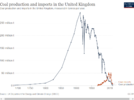- Joined
- 3 November 2013
- Posts
- 1,566
- Reactions
- 2,769
It seems that China, along with Western Europe, are struggling to deal with rising energy costs brought on by the fact that thermal coal is now at all time highs and gas is in limited supply.
China has had to ration its electricity use, with several industries & homes being asked to limit their use.

 www.scmp.com
www.scmp.com

 finance.yahoo.com
finance.yahoo.com
These measures have already had a direct impact on nickel prices. I wouldn't be surprised if other commodities are affected too.
Does anyone have any insights into how long this would be expected to last?
China has had to ration its electricity use, with several industries & homes being asked to limit their use.

China’s power shortage turns dire as traffic lights fail, homes fall dark
Half of China’s provincial jurisdictions mandate rationing of electricity, but poor communication and unclear timeline leave public fearful of further power cuts.
China power crunch spreads, shutting factories and dimming growth outlook
Widening power shortages in China have halted production at numerous factories including many supplying Apple and Tesla, while some shops in the northeast operated by candlelight and malls shut early as the economic toll of the squeeze mounted. China is in the grip of a power crunch as a...
These measures have already had a direct impact on nickel prices. I wouldn't be surprised if other commodities are affected too.
Does anyone have any insights into how long this would be expected to last?





